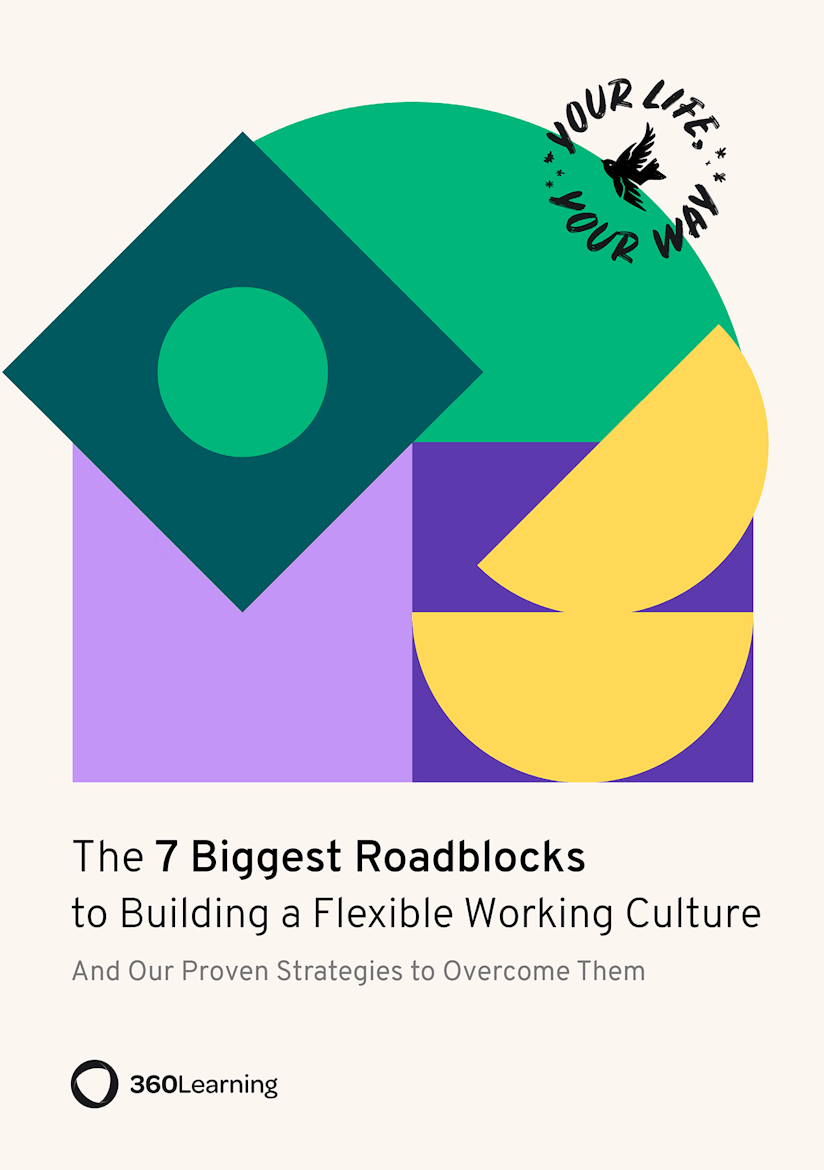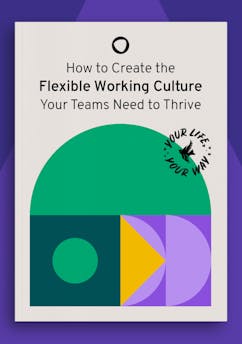Flexibility in Practice: How Leading Companies are Creating the Culture People Really Want
In previous chapters, we’ve explained exactly how to make flexible working happen, from supporting people to act with autonomy to enabling self-directed learning and career development. But explanations can only go so far.
To put things into practice, we’re here with four case studies illustrating how leading companies are creating the flexible culture people really want.
Case study 1: How Trello embraces remote and asynchronous work for smoother collaboration
Get to know Trello
Trusted by millions, Trello is the visual collaboration tool that creates a shared perspective on any project. Trello’s boards, lists, and cards enable you to organize and prioritize your personal and work life in a fun, flexible, and rewarding way. And if you know anything about 360Learning, you’ll know we’re huge Trello fans.
Trello is known for championing remote-friendly, hybrid, and asynchronous-first working policies. In early 2017, Trello was acquired by Atlassian.
What they offer
Trello has a distributed-first model based on remote and asynchronous work practices. As they explain on their job boards page, the company “...can hire people in any country where we have a legal entity. Assuming you have eligible working rights and a sufficient time zone overlap with your team, you can choose to work remotely or return to an office as they reopen (unless it’s necessary for your role to be performed in the office). Interviews and onboarding are conducted virtually, a part of being a distributed-first company.”
Part of what makes this distributed model work is their commitment to asynchronous communication. This includes asynchronous meetings run through video recording apps like Hypercontext, Loom, or Claap, so teammates can share quick and flexible updates, including screen shares.
Why it works
Asynchronous communication at Trello works for a few reasons:
- All (asynchronous) meetings have accompanying notes. This means that meeting follow-up is clear for everyone and there’s no ambiguity around next steps. Pointless back and forth is reduced.
- Introverts are given a voice: In real-time meetings, it’s usually down to a few extraverts to dominate the conversation. When communication goes async, it can empower everyone to candidly share their thoughts.
- Time zone differences become less important: It can be a nightmare to find a time when everyone on your globally-dispersed team can meet in real-time. Asynchronous meetings and one-to-ones limit this friction.
You can learn more about how Trello manages asynchronous meetings in their article here, as well as in their remote working guide, here.
Case study 2: AND Digital–The company that gives its employees an extra 13 days for upskilling
Get to know AND Digital
Ranked 2nd on the Glassdoor Best Places to Work UK 2022, AND Digital—a company that works with organizations to accelerate their digital delivery—has created a unique culture built around purpose, enjoyment, and learning.
What they offer
AND Digital has a decentralized organizational structure, where each office, or club as they call it, has the autonomy to define their own leadership team, culture, and vision. They also have a truly unique and flexible approach to career development.
They provide every employee with 13 days on top of their regular holiday allowance dedicated to upskilling and innovation, where each employee themselves decides what this constitutes. AND Digital also runs their own AND academy. Every quarter the academy team runs internal surveys to find out what skills are most in-demand. The team then creates learning opportunities around those topics which anyone can take.
In addition, Career Scrum Teams is AND Digital’s agile inspired approach to career development. Instead of using traditional performance review methods based on ratings, review documents and out of date objectives, their development framework is focused on Agile sprints to get people where they want to be.
The agile approach to career development means employees can develop quicker- every 6 months employees review what they’ve learned and achieved in order to get them one step closer to their goal. Then, they plan out the activities for the next 6 months.
Why it works
Flexible learning at AND Digital works for a few reasons:
- The upskilling allowance gives people time to learn, reflect on and then apply their new knowledge and skills.
- Their Career Scrum Teams enables people to be fully in charge of their own development, with people even getting to pick their own scrum team of leaders and mentors to help keep them on track.
Learn more about AND Digital culture here.
Case study 3: Why Spryker offers full remote working and unlimited vacation for higher employee flexibility and satisfaction
Get to know Spryker
Spryker Systems, based in Berlin and New York, is a commerce technology platform that enables global companies to build transactional business models. The fast-growing company aims to create a corporate culture where digital top talents love to work.
What they offer
Spryker has made flexibility a program with its cultural concept FLOW. Based on the conviction that work must integrate into life and not life into work, Spryker gives its employees the freedom to choose how, when, and and from where they want to work. This allows everyone to choose the conditions in which he/she can work most productively and creatively.
Besides the possibility of working temporarily from other countries, FLOW includes unlimited vacation days: on top of the minimum number of vacation days that must be taken by everyone, employees are allowed to request as much vacation as they need, in consultation with their manager.
Why it works
Spryker's flexible work culture goes hand in hand with principles of full ownership, accountability and high outcome orientation. In this way, the company creates full clarity for the what, while employees can freely decide on the how.
Here are some pillars supporting the company’s work culture:
- The company sets operational and individual goals with the help of Objectives and Key Results so that every employee knows what is expected of them.
- Regular 360° feedback allows everyone to continuously improve and develop.
- Spryker promotes strategic upskilling via self-learning tools, training and workshops, as well as free language classes and knowledge sharing sessions that ensures the internal exchange of knowledge.
- To strengthen team spirit and the sense of belonging in the remote-first company, Spryker organizes regular team events where everyone can meet and exchange ideas in person. A strong community and trust are the basis for the success of Spryker's flexible working and learning culture.
Learn more about Spryker’s FLOW culture here.
Case study 4: How Doctolib turned remote challenges into opportunities to learn and grow
Get to know Doctolib
Doctolib is a fast-growing European healthcare technology company with offices in Germany, Italy and France, offering an online booking platform that allows users to make medical appointments. In 2020, in the space of three weeks, Doctolib moved from 3,000 to more than 30,000 doctors using their platform for teleconsultations. In 2020, the company took its internal remote policy to the next level. Now, Doctolib has been recognized as one of the Best Places to Work in France and Italy in 2022.
What they offer
Doctolib operates in more than 40 cities across Europe and has adopted remote-first practices and tools before COVID-19 hit. Thus, switching to a full remote policy for its 1,200 employees almost overnight during the pandemic was fairly easy for them.
All Doctolibers can now choose from three models: either remote with a team meeting once a month, hybrid with two or three days a week in the office, or office-based, which means 100% of their time is spent in one of their offices.
Every employee who joins the company follows a five-day bootcamp to get started and learn the basics of Doctolib, and a three-month onboarding process to share knowledge with their team. They are introduced to their buddy, who usually is a seasoned Doctoliber who is here to guide them through their first days at the company.
Why it works
According to Doctolib, its remote policy allows for:
- Better focus: it has improved calendar organization and deep work opportunities thanks to more flexibility.
- Improved project documentation: They needed to write things down to properly track all their projects, so they moved to more asynchronous communication.
- The right employee mindset: Every single employee must invest time in his/her everyday work schedule to get to know his/her colleagues. Through 30-minute to 1-hour gatherings, Doctolib fosters employees to organize casual coffee chats, games, daily checkouts to develop and maintain team spirit.
Learn more about Doctolib’s flexible work culture here.
Next chapter: Flexible working tools.
Looking for a roadmap to implementing a flexible work culture? Download our strategic cheat sheet and learn how you can overcome the seven most common objections to building flexible work solutions.

So, you want to build a flexible working culture?
By providing your contact info, you agree to receive communications from 360Learning. You can opt-out at any time. For details, refer to our Privacy Policy.


